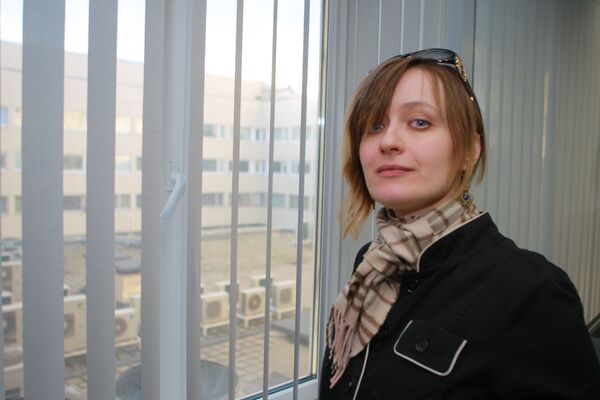It ought to go without saying that Russia’s state television is not doing too well these days. But every once in a while, Channel One, which remains popular with older people, will allow itself to stage an experiment.
Channel One’s most famous resident provocateur is director Valeria Gai Germanika, whose latest miniseries, “A short course on how to live a happy life,” centers on the lives of four professional women living and working in Moscow. While the miniseries discusses love and sex in particular, all parallels with HBO’s “Sex and the City” can only go so far.
Written by young novelist Anna Kozlova, “A short course” is really about sadness and delusion - and it lacks the lightness and gimmickry of “Sex and the City.” In the U.S., the HBO classic was aimed primarily at women living far away from New York City, offering them up a wry fantasy of what life is like for people who run all up and down Manhattan in beautiful, uncomfortable shoes. “A short course,” by contrast, is a critical look inward - pointedly detailing the emotional shortcomings and moral failures of its heroines.
Germanika, whose previous Channel One project, “The School,” scandalized TV-addicted pensioners with its disturbing portrayal of how petty high school cruelty spins dangerously out of control, is in many ways the perfect director for this latest project. While not particularly sophisticated, Germanika has an instinctive feel for what pushes viewers’ buttons. Having started her career as a documentary filmmaker, she rejects many of the trappings of bad television: the static camera, the chirpy soundtrack, the hospital-style lighting, the predictable editing.
Messy both in her personal and professional life, Germanika is the antithesis of Channel One’s Soviet-like image. In this sense, Germanika and Channel One are the perfect pairing: they legitimize one another. In tune with the legal and emotional nihilism that reigns supreme in many parts of Russian society, Germanika is able to turn this nihilism into the perfect consumer product. And while she receives government funding, she doesn’t even have to worry about being commercially successful - though it’s not as if her work doesn’t receive plenty of attention in Russia.
Having said all that, I must point out that “A short course on how to live a happy life” is not that great. It’s not horrific, for sure, and it’s not even bad, as some critics have alleged - it just has the look and feel of a miniseries that was put together fairly hastily.
The kind of intentional directorial sloppiness that works well in a documentary is frustrating to watch when you’re dealing with the love lives of urbanites. Perhaps it would have worked better for a project that was done on a smaller scale, but a full-blown sexual epic requires more precision. Too many of Germanika’s shots here appear aimless, and a lot of the potential irony of the screenplay is not brought into focus.
Last summer, I ran into one of the stars of “A short life,” Ksenia Gromova, who praised Germanika’s directing skills to me - in particular, Ksenia was impressed with the way in which Germanika works with actors. As a viewer, I have no reason to doubt Ksenia’s words - Germanika has a modern approach to acting, the terrible pathos so beloved by many of the rank-and-file Russian television directors is completely alien to her.
Yet Germanika, with her inventive outfits and scandalous reputation (she once physically attacked critic Olga Shakina, for example, as Olga and her co-host Anna Mongait recalled on Dozhd TV recently), is not the best example of the Russian trend of adapting the documentary style and using it to illustrate fictional stories, be it on TV or on the stage. She’s just its biggest celebrity.
I don’t think that’s a bad thing. I think Russia needs more genuinely weird, ambivalent celebrities - the kind of people who make the babushkas feel nervous.
I’ve said this before, and I’ll say it again, and I’ll keep saying it and saying it - Russia’s aging population needs young and energetic and arrogant people to keep it on its collective toes. And for as long as the “zombie box,” as Russian television is widely known, retains its all-important status among pensioners - we better hope Germanika keeps her job there.
The views expressed in this article are the author's and do not necessarily represent those of RIA Novosti.
Trendwatching in Russia is an extreme sport: if you’re not dodging champagne corks at weddings, you’re busy avoiding getting trampled by spike heels on public transportation. Thankfully, due to an amazing combination of masochism and bravado, I will do it for you while you read all about it from the safety of your living room.
Natalia Antonova is the deputy editor of The Moscow News. She also works as a playwright – her work has been featured at the Lyubimovka Festival in Moscow and Gogolfest in Kiev, Ukraine. She was born in Ukraine, but spent most of her life in the United States. She graduated from Duke University, where she majored in English and Slavic Literature. Before coming to Moscow, she worked in Dubai, UAE and Amman, Jordan. Her writing has been featured in The Guardian, Foreign Policy, Russia Profile, AlterNet, et al.
Trendswatcher: The Curious Case of Philipp Kirkorov
Trendswatcher: Of lady-business and Soviet imagery
Trendswatcher: Dinosaurs Stalking Moscow Playgrounds
Trendswatcher: Putin Quoted Lermontov and the Lit Geeks Rejoiced
Trendswatcher: Whitney Houston Is Dead, Long Live Whitney Houston
Trendswatcher: The Trouble with ‘Intimate’ English
Trendswatcher: When Looking ‘Normal’ is a Matter of Life and Death
Trendswatcher: An Education. The Foreign Kind
Trendswatcher: The rich also bruise
Trendswatcher: Marriage needs magic? Don’t go for the literal kind!

